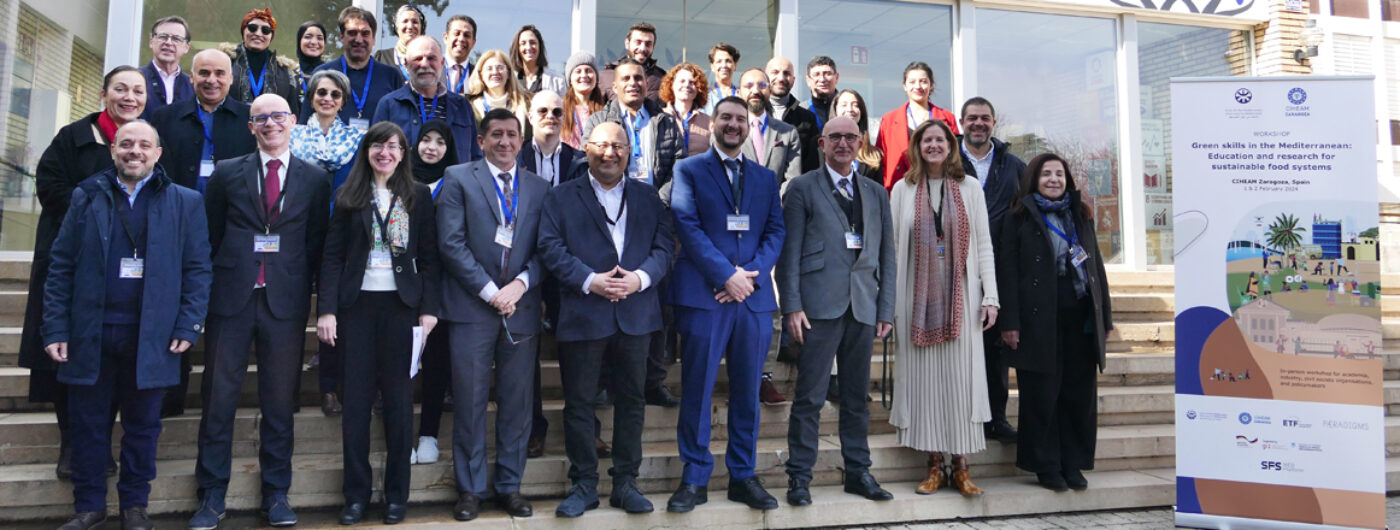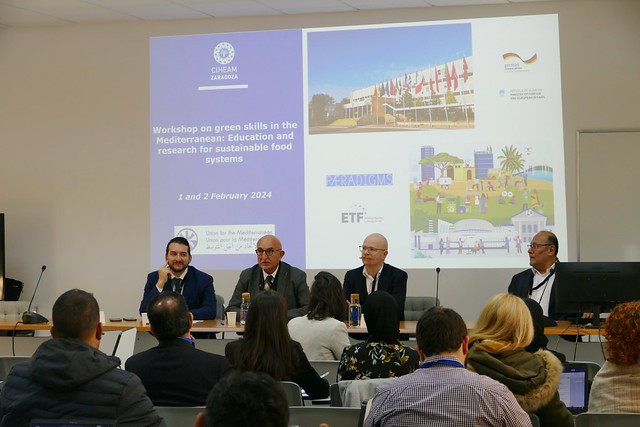
Empowering sustainable futures through green skills
- The Workshop on Green Skills in the Mediterranean, held in Zaragoza, Spain, addressed high unemployment rates and skills gaps in the region, emphasizing the role of education and research in fostering sustainable food systems and careers.
- It attracted participants from 15 Euro Mediterranean countries, representing academia, industry, policymakers, and civil society, highlighting the event’s multi-sectoral approach to sustainability and regional collaboration.
- The workshop aimed to inspire participants to integrate green skills into academic curricula and professional practices, focusing on technical green skills related to sustainable food systems. Through interactive sessions, participants developed strategies for incorporating green skills into their work.
1-2 February 2024, Zaragoza, Spain. Education and research play pivotal roles in fostering sustainable food systems and shaping promising career paths. In alignment with the UfM Ministerial Declaration on Research and Innovation, which stressed the need to building knowledge and skills for the inclusion of Mediterranean graduates and researchers as a tool to reinforcing the research and innovation agendas in the region, the Workshop on Green Skills in the Mediterranean: Education and Research for Sustainable Food Systems convened at CIHEAM’s headquarters in Zaragoza over the course of two days.
Co-organised by the Union for the Mediterranean and CIHEAM Zaragoza, with collaborative support from the European Training Foundation (ETF), technical guidance from Paeradigms and supported by the German Development Cooperation (GIZ) and the Slovenia Ministry of Foreign and European Affairs, the workshop garnered participation from 15 Euro Mediterranean countries. Attendees hailed from academia, industry, policymakers, and civil society institutions, emphasizing a multi-sectoral approach to sustainability.
At the heart of this initiative lies a deep-rooted concern for the region’s pressing challenges: high unemployment rates among youth and women, and a profound skills gap between higher education and employer demands. Recognizing the transformative power of education and research, the workshop aimed to bridge this gap by integrating green skills into academic curricula and professional practices.
“Employability and innovation are intrinsically connected with the green transition, and they should complement our drive to advance on sustainable food systems, whose impacts are intimately connected to climate change, renewable energy and health.” – Giuseppe Provenzano, UfM Project Manager, Higher Education and Research Division.
The objective of the workshop was to inspire participants to be aware and proactively drive the integration of green skills into academic curricula or similarly integrate them in their activities, while also actively contributing to the advancement of sustainable food systems, food security and regional dialogue on the “Just Transition”. The workshop has focused on technical green skills linked to sustainable food systems, from two perspectives: a technical perspective through food production and agriculture, and a policy-level perspective looking at national frameworks and sustainability.
Through interactive activities and training sessions, participants developed case studies on how green skills could be included in their professional life for changing educational model and the interaction with business sector.
Following the success of the initiative, a second training focusing on renewable energy is scheduled to take place in Algeria in 2024.
This activity has supported the SFS-Med initiative, where the UfM cooperates with the FAO, PRIMA and CIHEAM.
More on the activities of the Higher Education and Research Division.
More on the innovation-employability nexus – consult our publications:
- Towards a Union for the Mediterranean Strategy on developing new Vocational pathways in Higher Education
- Reinforcing the Innovation-Employability Nexus in the Mediterranean – A Handbook for Academia, Industry and Policymakers


